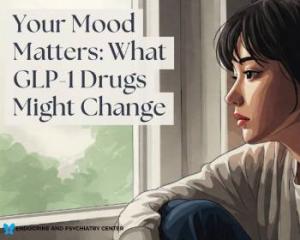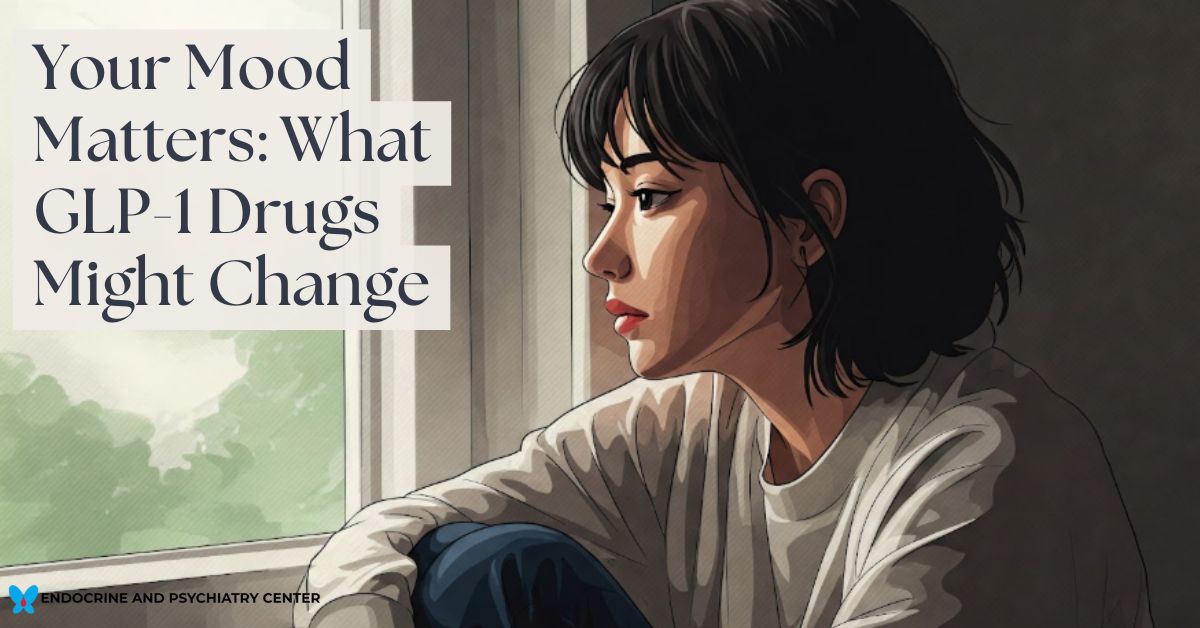- About Us
- Locations
- Meet the Team
-
Patient Resources
-
-
Patient Information
-
-
-
Services
-
-
All Services
-
Proudly Part of Privia Health

More Than Weight Loss: The Truth About Ozempic Face, GLP-1 Drugs & Your Mental Health

What’s All the Buzz About?
If you’ve been online lately, you’ve probably heard terms like:
- “Ozempic face”
- “GLP-1 meds and depression”
- “Mounjaro made me moody”
So what’s going on? Are these weight loss drugs doing more than shrinking your waistline?
In this blog, we’ll explore:
- What “Ozempic face” really means
- The science behind GLP-1 medications
- How these drugs may affect mood and mental health
- What’s fact, what’s myth—and how to protect yourself
Let’s separate truth from TikTok.
What Is Ozempic, Anyway?
Ozempic (semaglutide) is part of a group of medicines called GLP-1 receptor agonists. These drugs:
- Help people with type 2 diabetes
- Support weight loss by reducing appetite
- Slow down how fast food leaves your stomach
- Lower blood sugar levels
Other GLP-1 drugs include:
- Wegovy (semaglutide at a higher dose, approved for weight loss)
- Rybelsus (oral semaglutide)
- Mounjaro (tirzepatide – works on GLP-1 and another hormone called GIP)
What Is “Ozempic Face”?
“Ozempic face” is a term used to describe changes in facial appearance after weight loss, especially:
- Sagging skin
- Hollow cheeks
- Wrinkles looking deeper
But here’s the truth: it’s not Ozempic’s fault.
It’s Just Weight Loss
When you lose a lot of weight—especially quickly—you can lose fat in your face too. This happens with:
- Diet
- Exercise
- Weight loss surgery
- Other medications
Fat gives your face a youthful, plump look. So when fat goes away, your skin can look looser or older.It’s not caused by a drug—it’s caused by fat loss.
Can You Prevent “Ozempic Face”?
Yes—and here’s how:
- Lose weight slowly, if possible
- Stay hydrated
- Eat protein to support skin health
- Talk to a doctor about skin treatments if it bothers you
Dermatologists may suggest fillers or skin-tightening procedures, but these are cosmetic, not medical.
Let’s Talk Mental Health: GLP-1 and Your Mind
Now to the deeper topic: mental health. Some people have posted online that GLP-1 drugs:
- Made them feel depressed
- Changed their mood
- Made them anxious or “off”
Others say the drugs improved their mental health. So what’s the real deal?
What Does the Science Say?
Right now, the research is mixed but still growing.
Some studies suggest:
- GLP-1 drugs might reduce food cravings, which can help people feel more in control.
- Losing weight may boost self-esteem and lower depression in some patients.
- However, some people report increased anxiety, sadness, or mood swings.
So far, the FDA has not found strong evidence that GLP-1 drugs cause major mental health issues. But they’re watching closely.
Why Might Mood Changes Happen?
Let’s break down some possible reasons people feel different on GLP-1 meds:
1. Hormones Are Changing
GLP-1 meds affect hormones that signal hunger and fullness. But those same hormones may also play a role in:
- Mood
- Motivation
- Brain chemistry
We’re still learning how all these systems connect.
2. Your Diet Is Changing
When you’re eating less:
- Your blood sugar might dip
- You might skip meals
- You might feel tired or irritable
Low blood sugar can affect mood—even in people without diabetes.
3. Your Relationship With Food May Shift
If you’ve used food as comfort (many of us do!), losing your appetite may feel strange or sad. This emotional shift can feel like a loss—and some people grieve that.
4. Weight Loss Can Bring Up Old Feelings
For some people, rapid weight loss brings up:
- Past trauma
- Body image struggles
- New attention from others, which may feel uncomfortable
This doesn’t mean the medicine is “bad,” but it does mean support is important.
Are GLP-1 Meds Linked to Depression or Suicide?
This question came up after some European health agencies started reviewing reports of:
- Suicidal thoughts
- Depression
- Self-harm behaviors
But here’s what you should know:
- These cases are rare
- No clear link has been proven
- The FDA and other groups are still investigating
Always tell your doctor if you experience:
- Sadness
- Hopelessness
- Trouble sleeping
- Thoughts of self-harm
Your mental health matters just as much as your physical health.
Who May Be at Higher Risk for Mental Health Side Effects?
Some people might be more sensitive to changes:
- People with a history of depression or anxiety
- Those with a past eating disorder
- People using other medications that affect mood
- Patients with thyroid issues or hormone imbalances
If this is you, talk with your doctor before starting a GLP-1 med.
Are There Any Mental Health Benefits?
Yes! Many patients actually report feeling better, such as:
- More confidence
- Less stress about food
- Better sleep
- Less emotional eating
Some researchers believe GLP-1 meds may calm reward centers in the brain, making food cravings less intense. That can feel empowering.
What About Kids or Teens?
Wegovy is approved for weight loss in some teens over 12, but mental health support is extra important in younger patients.
Parents should watch for:
- Mood swings
- Withdrawal
- Big changes in sleep or appetite
Teens need a care team that includes a doctor, mental health provider, and family support.
Should You Stop the Medication If You Feel “Off”?
Not right away. But do talk to your doctor. They may:
- Lower the dose
- Add mental health support
- Try a different medication
Never stop a GLP-1 med on your own without medical advice.
What Should You Do If You’re Worried About Mental Health?
Here’s a helpful checklist:
Step 1: Check In With Yourself
- Am I feeling more sad or anxious than usual?
- Am I eating enough to fuel my body?
- Have I lost interest in things I used to enjoy?
Step 2: Talk To Your Doctor
- Bring a list of your feelings and symptoms
- Ask if your medication could be playing a role
- Be honest—it helps your provider help you
Step 3: Get Support
- Consider talking to a therapist
- Reach out to support groups
- Stay connected with friends and family
The Bottom Line: What’s True, What’s Not?
Let’s break it down clearly:
|
Statement |
True or False |
| GLP-1 drugs melt your face | False – Weight loss can change facial fat, not the drug itself |
| Ozempic causes depression | Unclear – Some patients feel different, but no proven link |
| Everyone gets side effects | False – Most people do well, but some need adjustments |
| Mental health doesn’t matter | False – It matters just as much as blood sugar or weight |
| You should always talk to your doctor | TRUE – Always, always, always |
Simple Summary: What You Need to Know
- Ozempic face is just a nickname for normal fat loss in the face
- GLP-1 meds help with diabetes and weight loss—but mental health needs attention too
- Most people feel fine, but some may feel mood changes
- Talk to your doctor if anything feels off
- Your emotional health is part of your total wellness
5 Smart Questions to Ask Your Doctor
- Could this medicine affect my mood?
- What should I do if I feel sad or anxious?
- Are there mental health side effects I should watch for?
- How can I lose weight in a way that’s good for my mind and body?
- Can I see a mental health provider as part of my treatment?
Final Thought: Treat the Whole You
Weight, blood sugar, body image, self-esteem, emotions—they’re all connected. GLP-1 drugs can be a helpful tool, but they’re not magic. You deserve full care—body and mind.
Don’t be afraid to ask questions. Your health journey is about more than numbers—it’s about feeling strong, confident, and well.